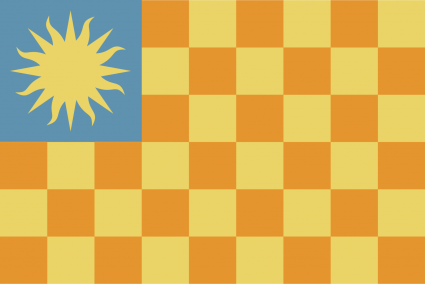
WARNING
The following thread may contain scenes of implied adult situations. Reader discretion is advised.
The following thread may contain scenes of implied adult situations. Reader discretion is advised.

![]() by Ghant » Sat Sep 23, 2017 8:10 pm
by Ghant » Sat Sep 23, 2017 8:10 pm


![]() by Ghant » Sat Sep 23, 2017 8:20 pm
by Ghant » Sat Sep 23, 2017 8:20 pm


![]() by Ahkad » Thu Oct 05, 2017 4:33 pm
by Ahkad » Thu Oct 05, 2017 4:33 pm

![]() by Mutul » Mon Oct 30, 2017 7:56 am
by Mutul » Mon Oct 30, 2017 7:56 am

![]() by Mutul » Sun Nov 05, 2017 7:02 am
by Mutul » Sun Nov 05, 2017 7:02 am

![]() by Lihnidos » Tue Nov 21, 2017 5:14 pm
by Lihnidos » Tue Nov 21, 2017 5:14 pm

![]() by Mutul » Fri Jun 15, 2018 4:16 am
by Mutul » Fri Jun 15, 2018 4:16 am
“There is among the disciples of the Hun Caquix, those who consider human sacrifices to be a disgusting practice. They call it “ritual murder”, and consider it to be an abhorrent display of violence, to be completely amoral. Everywhere they are, and even where they aren’t, they’ve condemned it and tried to outlaw it.
But understand this : this is not a question of “decency” or “violence” for the disciples of the Hun Caquix. They who declare armed pilgrimage, they who announce the Holy Wars, they who try to stamp the gods of this Earth in the name of their lord, they know nothing of the traditions. They don’t even know their own traditions, as like the house of Xibalba, they’re a divided house : Christians against Christians, Muslims against Muslims, Jews against Jews. And then all against each others. And all these people know nothing of each others. Understand this ! Being brothers under the Hun Caquix means to have each other blood not in your veins, but on your hands.
No, all their arguments are mere excuses in their mouths. They do not see their own nature, and they do not know of the Paths. They want all to be one, and don’t see the coherence in the multitude. They don’t even see coherence in their own communities, in their own families, in their own houses.
But this is even more clearer in the way they deal with humanity’s own fallings. Humans are full of failings. Of defects. Of little errors that brings us away from the perfection of the gods. See this ! This here insect that I hold in my hand is closer to perfection than a man can be ! This is the price of the freedom the gods gave us : to move you need space. Being perfect means to have no fault, it means to have nothing. It means you cannot move yourself in your own cracks, because there is none. There is only you, full of yourself. Animals and plants don’t have this problem, they are as they were created. They are they way the gods molded them, through the cataclysms, through the control of their offsprings. But mankind is more than that : because we are not perfect.
However, what does a human wish to do ? He wish to do goods toward his gods : his creators and his lords. He wish to please them. He wish to be closer to them. Yet he can’t. Because he’s not perfect. He will fail. And he will grow to resent these failures, to ask for forgiveness.
And how does one do to ask for forgiveness ? Well, how do you do when you want the woman you truly love to forgive you ? You plea for her to even look at you, you offer her the best gifts you can find, you fall on your knee and offer yourself entirely. Understand this : the true love between a man and a woman is nothing before the true love between mankind and their gods.
This is why you tattoo your body. This is why you pierce and cut your skin. This is why you dance, sing, and cry in the temples. This is why you celebrate the gods : to thank them for the life they gave unto you. To ask them for forgiveness for your failures. This is why you follow the White Path : to learn how to be more pleasant to the gods that protect and nurture you. But even a true pilgrim, one who’s almost reach the end of the White Path will fail, because as long as there’s flesh on his bones, he’s human. And because he’s human, even the greatest of us, master of the masters, will fail. And this is why you burn offerings on the altars of the gods.
But what do the man who doesn’t listen to the gods ? What do we do to the man that lied to his mother ? Stole from his father ? killed his brother ? Raped his sister ? What do we do to the man that thought of himself as a god and, full of himself, thinking of being perfect, commited the gravest of all crimes for nothing ? For what he thought would gain him in the short term, he became an atrocious man, and refused to listen to the gods and his brothers. he listened only to the demons in his hearth, and this is why he will join Xibalba with the rest of the demons.
So, what do we do with the man ? Do we let him be lost forever, in Xibalba ? Will we abandon even the worst of us all to Xibalba ? Of course not. This is why the gods, in their kindness, prepared for this man a second chance. They prepared for him a question : Cuxtal ayel Camel ? Life or Death ?
A man that die on the altar is forgiven. A new life will sprout from the ashes of his past crimes. A soul entirely purified, so he can start anew. A man who readily choose the ultimate sacrifice, the sacrifice of his own self, on the altar, is a man that deserve his pardon in the eyes of the gods. But why would this be a question then ? Why won’t they all choose to be pardoned ? Because like all selfish creature, they have nothing but self-preservation in their mind. Short sighted self preservation. They will protect their body, which they think is everything they have, over their spirit. They will prefer to let their spirit rot in Xibalba rather than for once show bravery. They will choose life. And they will spend a long life in misery, with nothing but their rotting soul, with their rotting body, until there’s no flesh on their bones and they’re no longer human, they’re a rotting soul in Xibalba.
So what do they do, the disciple of Hun Caquix ? What do they do for their own guilt ? What do they do when they’ve hurt the woman they love ? They say “she will forgive me, for she is full of forgiveness” and they do nothing. They return to their room, doing nothing, and still expecting food on their table, because she is “full of forgiveness” and will pardon them, over and over, so they can continue to be little, small, men. They think they are entitled to forgiveness, because that’s “who they are”. They think if you can’t love them for who they are, do you deserve them ? They are full of themselves, they can no longer move, because in their mind, they’ve turned their faults, their mistakes, into qualities. Now in their minds, they are “perfect”. And perfection doesn’t move. So they stay, and they rot away. They rot away until they discover Xibalba, where the false teaching of the Hun Caquix bring them.
So what do they do, when they hear the Question ? What do they do, when the gods ask them : life or death ? They shiver. They turn pale, they flinch. “Oh Hun Caquix ! Why do they attack my perfection ?” he ask. And then he say “Of course I will choose my perfect life ! What an horrible choice !” Their ears are closed, their hearts are walled against all, Hun Caquix did a wonderful job.
And when they see someone who commited all crimes, what do they do ? They kill him. Nothing more. Man justice. “I am entitled to give justice, and I say this man deserve death.” This is how their judges speak. Or worse : they do nothing. “Hun Caquix taught us to preserve the perfection that is all men.” And they refuse to save a soul that could have been saved. Their lips are sealed to the Question. Once again, Hun Caquix did a wonderful job.
Truly, pity the man who worship the Hun Caquix. For he was given the impression of perfection. And now he’s worshiping a false god, a bird upon a cross. “I will save you from all death” say the birds. “For you are perfects” he continue. And they say “Yes, oh Lord, we are your perfect son. We await patiently for your kingdom to come, for your kingdom named Xibalba.”

![]() by Mutul » Sat Sep 29, 2018 2:42 am
by Mutul » Sat Sep 29, 2018 2:42 am
When the Third World was created, the gods gathered all of mankind on the Mountains. In the Caves of the Mountains, Each tribe of mankind received their patrons gods. The K’iche were put under the patronage of Tohil, Awilix, and Jakawitz, and each House of the K’iche received the blessing of one of these gods. The Thirteen Central Cities (Oxlahun Olnalab) and the Central Island (Ayeli Amayeli) were most favored as Chaac directly blessed them with his rule. He came down among them, taking a mortal form, and in the end ruled them as a divine lord. This is why the Mutul is most favoured by Chaac under his many forms and continue to worship him. And this is why Ayeli Amayeli received the blessing of an older and wiser Chaac who came among them and taught them all about the arts of his house : the river and the sea. This old Chaac, one of the Mamlab, they know as the Long Man, and the Long Man gave them bloodlines of divine warriors to protect them, while his wife the Maize Goddess gave them bloodlines of Medecine Men to guide them. They followed the Long Man on his road to the sea, and made their houses with him on the sea.
This is why you, children of the Oxlahun Olnalab and of the Ayeli Amayeli, must worship Chaac, under all of his form. For He taught your ancestors everything they knew, and made turned them into great men beyond our reckoning. Water is his blood, Lightning his weapon, the Sky his house, and the Sea his grave. So I must ask you, why are you not thanking Chaac ? Why does your heart not know him ? Why do you cover your face when it rain, why do you turn away your eyes from the cloud ? Why is your mind closed to Chaac, the father of your father, the teacher of your teachers ?
Here is the Revelation : generations after generations, your lines turned away from Chaac. Gratitude and Love died out, and before the power of the Chaac there was only fear. Fear the Chaac ! For he is terrible ! Thunder is his voice, Lightning his weapon ! The Wise Man fear the gods, and Chaac is mighty among them !
But soon, even fear was forgotten as even if love for Chaac had left, his gifts were still among his people. And they considered them as granted, without remembrance of why they deserved them. And so Chaac took away his gifts from those who forgot him, and his wrath was mighty. And still, they didn’t knew of him.
And then, from the east came a nation of men that knew of no god. They only worshipped a cross and gold dresses. They planted their cross on this island, the island of your ancestors. And claimed it in the name of the cross. They persecuted your ancestors, and many of your ancestors brothers, sisters, parents, and neighbors, were killed by the Men of the East. Those they did not killed, they tied to the Cross they worshipped. “Bow before your new god !” they screamed at them, and fearful they bowed. And what was left of humanity in your ancestors was taken away, as the Men of the East came always more numerous, always more greedy, always more cruel.
You who have nothing, stop bowing before the Cross ! You who look at the ground weeping, look at the Sky ! Do you not see the rain coming ? Do you not hear the thunder ? Your ancestors may have abandoned Chaac, but Chaac has not abandoned you ! A storm is coming, and it will wipe out the cross, it will wipe the slate clean, it will purge this island from all evil, it will restore Ti Ak’bal to what it once was : Amayi Amayeli, the Island of Waters ! The Island of Chaac’s blood ! He cut his heart open for you once, and he will do it again ! You cut your heart open for Him once, even if centuries of oppression and degradation hide it from your memories, will you do it again ? Will the blood of the sky and of the earth be intertwined and unite in a new covenant ? Oh people ! Hear the Divine Words ! Heed the Words of Thunder ! : Yes ! It will ! Here come the New Dawn ! Here come the Storm !
Here come the CHAAC !

![]() by Liothidia » Wed Dec 12, 2018 5:17 pm
by Liothidia » Wed Dec 12, 2018 5:17 pm


![]() by Liothidia » Sat Dec 15, 2018 7:19 pm
by Liothidia » Sat Dec 15, 2018 7:19 pm


![]() by Arthurista » Sun Dec 16, 2018 2:57 pm
by Arthurista » Sun Dec 16, 2018 2:57 pm

![]() by Lacus Magni » Mon Dec 17, 2018 2:11 pm
by Lacus Magni » Mon Dec 17, 2018 2:11 pm

![]() by Ghant » Fri Jan 18, 2019 12:57 am
by Ghant » Fri Jan 18, 2019 12:57 am


![]() by Enyama » Sat Jan 26, 2019 1:27 pm
by Enyama » Sat Jan 26, 2019 1:27 pm

![]() by Lacus Magni » Fri May 03, 2019 5:34 pm
by Lacus Magni » Fri May 03, 2019 5:34 pm

![]() by Tulura » Sat May 11, 2019 11:55 am
by Tulura » Sat May 11, 2019 11:55 am

![]() by Leasath » Wed Jun 26, 2019 4:38 pm
by Leasath » Wed Jun 26, 2019 4:38 pm

![]() by Mutul » Tue Aug 27, 2019 8:21 am
by Mutul » Tue Aug 27, 2019 8:21 am

![]() by Yisroel » Sat Jan 04, 2020 11:15 pm
by Yisroel » Sat Jan 04, 2020 11:15 pm


![]() by Cynereth » Sat Feb 01, 2020 11:29 pm
by Cynereth » Sat Feb 01, 2020 11:29 pm


![]() by Nordwalsh » Sun Jan 17, 2021 1:40 am
by Nordwalsh » Sun Jan 17, 2021 1:40 am

![]() by Mutul » Sat Nov 27, 2021 3:22 pm
by Mutul » Sat Nov 27, 2021 3:22 pm

![]() by Gristol-Serkonos » Wed Feb 08, 2023 11:19 pm
by Gristol-Serkonos » Wed Feb 08, 2023 11:19 pm
DEPARTMENT OF NATIONAL DEFENCE NOTIFICATION:
CHDEF. GEN. Panaligan, LR ARMY
SECDEF GAT. Timog, KnTP
PALACE APPROVES OPLAN UNOS.
UNITS STANDBY FOR DEPLOYMENT ORDERS.
Lusoñan Republic Navy Units:
Offshore Surface Combatant Force
Sealift Amphibious Warfare Force
Lusoñan Republic Marine Corps Units:
530th Marine Battalion
521st Marine Battalion
335th Marine Reconnaissance Battalion
Lusoñan Republic Army Units:
4th Air Mobile Regiment
9th Mechanized Infantry Regiment
Lusoñan Republic Air Force Units:
9th Fighter Wing
667th Air Lift Wing

![]() by Yisroel » Sun Nov 12, 2023 9:03 pm
by Yisroel » Sun Nov 12, 2023 9:03 pm


![]() by Aureumterra III » Thu Nov 16, 2023 10:57 pm
by Aureumterra III » Thu Nov 16, 2023 10:57 pm

Advertisement
Users browsing this forum: No registered users
Advertisement